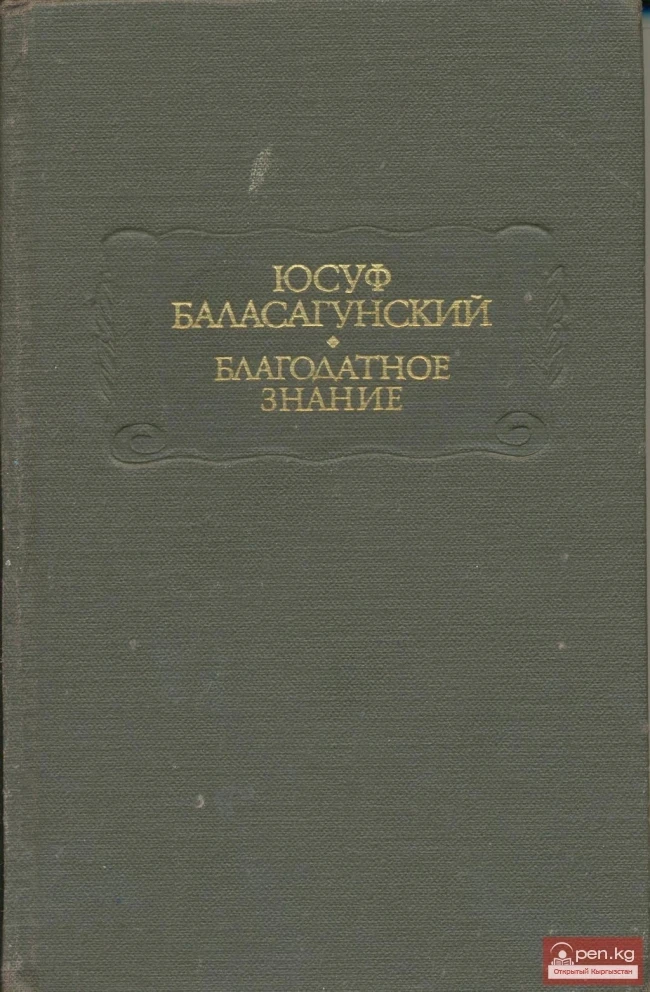Jusup Balasagyn: "The Gracious Knowledge"
Little is known about Jusup Balasagyn, the author of the greatest work — the poem “Blessed Knowledge”, or “The Science of State Governance.” He was born around 1010-1016 (1018) in the capital of the medieval Karakhanid state — the city of Balasagyn. He was a highly educated man of his time — possessing profound knowledge in astronomy, mathematics, medicine, history, philosophy, aesthetics, ethics, literature, Arabic and Iranian-Tajik poetry, Turkic folklore, and the Persian language. He exhibited both breadth and depth of thought.
By the time he completed the poem, the author was 54 years old. He began writing it in Balasagyn and finished it between 1067 and 1070 in Kashgar, thus working on it for 18 months. It is known that Jusup Balasagyn presented his creation as a gift to Tavaqch Bura Karakhan Abu-Ali-Khasan — the ruler of Kashgar. As an enlightened person, he duly appreciated the profound content and vivid poetic form of the work. The poet was awarded the high title of Ulugh Hass-Hajib (Arabic, hass — a respected person at court, the chief advisor to the khan), a title bestowed upon the most famous, authoritative, and closest individuals to the khan's court.
“Blessed Knowledge” by Jusup Balasagyn — a work written in the traditional ethical-didactic style of Eastern culture, has a characteristic instructive and educational orientation. The genre originated in the ancient literature of Egypt, India, and Iran, and then became well established in Eastern written and oral literature. In Europe, it formed as the genre of “mirror” much later — during the Renaissance, five centuries after the appearance of Jusup Balasagyn's work.
The poem represents a significant universal interest as a spiritual, moral-ethical encyclopedia, reflecting the history, culture, and religious views of society during that era. It can be appreciated as an epic work, where questions about the meaning and content of human life, and about social and personal relationships, are examined through the lens of the author's philosophical views and positions. The ethical and moral principles of the author are vividly expressed through concepts of justice, reason, happiness, modesty, and are personified in specific characters. For instance, the ruler Kuntuudu symbolizes justice, the vizier Aytoldu symbolizes happiness, the vizier's son Akdilmish symbolizes reason, and the vizier's brother Otkurmush symbolizes modesty. Even the names of these heroes are filled with high allegorical-symbolic content.
“Blessed Knowledge” by Jusup Balasagyn contains a wealth of information about the social structure of that time — about the place and role of all social groups, and about social norms and rules. The philosopher reflects on the dialectics of such concepts as good and evil, truth and falsehood, generosity and greed, prudence and impatience. At the same time, the author's ethical views are closely linked to his epistemological and social concepts. Moreover, they are part of his worldview. He often reiterates the idea that in both politics and other relationships, the main criterion of human essence should be humanity. Thus, the foundation of the ethical-philosophical, political, and social worldview of the outstanding thinker-humanist of medieval Kyrgyzstan, Jusup Balasagyn, consists of humanism and universal moral-ethical values.
Read also:
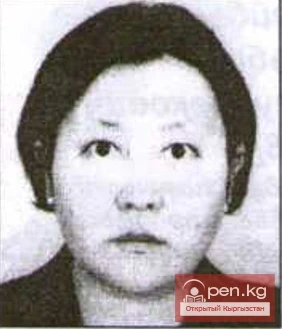
Kudayberdieva Gulmira Zulpuqarovna
Kudayberdieva Gulmira Zulpuqarovna (1962), Doctor of Medical Sciences (2001) Kyrgyzstan. Born in...

Persian Rowan \ Persia Alma-Chetini \ Persian Rowan
Persian Rowan Status: VU. Endemic, ornamental species....
At the Bishkek CHPP, a fire and ammonia leak were simulated
At the CHP of the capital of Kyrgyzstan, exercises were held as part of the Civil Defense Training...
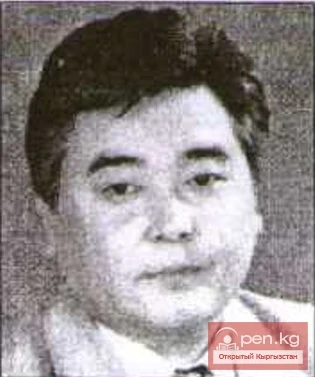
Mamatov Sagynaly Murzaevich
Mamatov Sagynaly Murzaevich (1966), Doctor of Medical Sciences (2001) Kyrgyz. Born in the village...
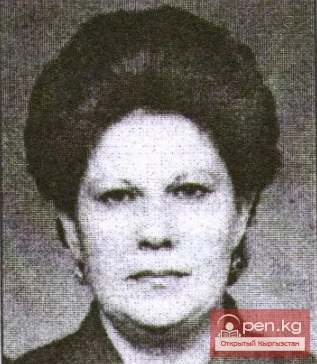
Kononets Irina Evgenyevna
Kononets Irina Evgenievna (1950), Doctor of Medical Sciences, Professor (2002) Russian. Born in...

Technology Festival Tech and Science Fest
For the first time, Kyrgyzstan will host the Tech and Science Fest, a significant event in the...
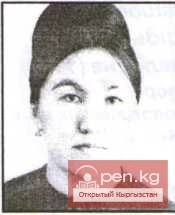
Bakassova Zaryl Bakasovna (1932)
Bakasova Zaryl Bakasovna (1932), Doctor of Chemical Sciences (1977), Professor (1992),...

The Slovak Court Sentences Shooter of Prime Minister Fico to 21 Years in Prison
Juraj Cintula As a result of the trial, Cintula was found guilty of a terrorist act. Despite the...

The President of Uzbekistan will visit Brussels on an official trip on October 23-24.
Shavkat Mirziyoyev - President of Uzbekistan // Website of the President of the Republic of...

Mosquitoes Discovered in Iceland for the First Time
The mosquito Culiseta annulata is visible on the control monitor connected to the microscope in...

Peskov: Putin, like Trump, does not want to waste time in Budapest
Dmitry Peskov Russian President Vladimir Putin and his American counterpart Donald Trump are...

Chuya Sharp-wing / Uchtoo Kanat / Eastern Ostroluchka
Chuy Ostroluchka Status: 2 [CR: C]. Possibly already extinct in Kyrgyzstan, an endemic...

Trump announced that he canceled the meeting with Putin in Budapest
Illustrative photo Trump emphasized: “I canceled the meeting with Putin because I see no point in...
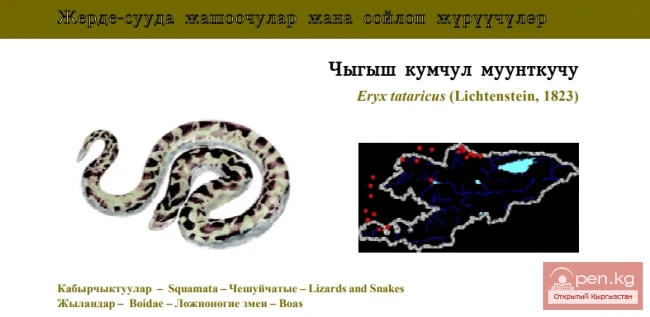
Eastern Sand Boa / Chygys Kumchul Muuntkuchu / Tatary Sand Boa
Eastern Sand Boa Status: Near Threatened (NT). One of 10 species of the genus, which includes...
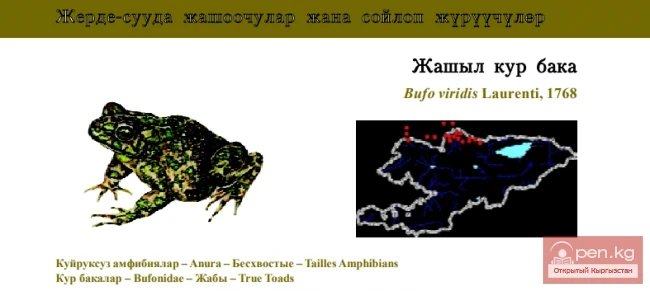
Central Asian Frog / Kyzyl Koltuk Frog / Middle Asia Wood, or Asiatic Brown, Frog
Central Asian Frog Status: Category VUB1ab(iv). A mosaic-distributed species with a disjunct and...
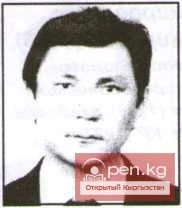
Bakassov Stalbek Sabdrakunovich (1950)
Bakasov Stalbek Sabdrakunovich (1950), Doctor of Medical Sciences (1995), Professor (1996)....
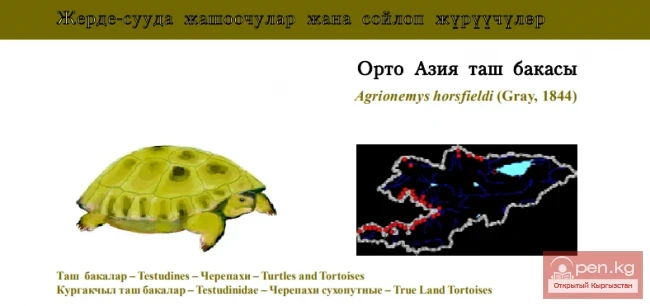
Central Asian Tortoise \ Orto Asia Tortoise / Steppe, or Afghan, Tortoise
Central Asian Tortoise Status: VU Blab (ii, iii, v); Cl. A representative of a monotypic genus,...

EU countries approved the 19th sanctions package against Russia
Illustrative photo The European Union has confirmed the approval of the 19th package of sanctions...

Kyrgyzstani Alexander Zelichenko won a prize in a literary competition in the United Kingdom.
Writer from Kyrgyzstan, police colonel Alexander Zelichenko took second place in the literary...
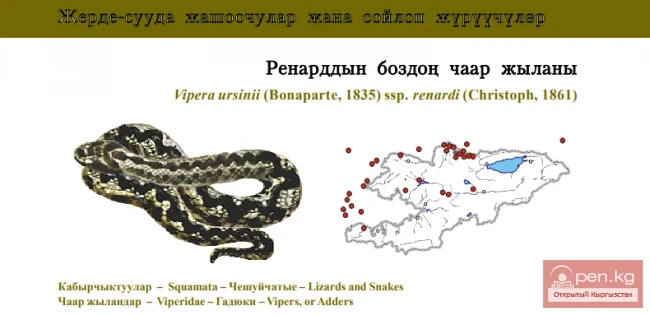
Renard's Meadow Viper
Renard’s Meadow Viper Status: Category VUA4bc. A subspecies of the south-west Palaearctic species,...

The volume of transactions with stablecoins worldwide exceeded $46 trillion in a year
According to the annual report State of Crypto 2025, prepared by the venture capital firm...

Prime Minister Orban: Preparations for the Trump-Putin Summit Continue
Prime Minister of Hungary Viktor Orban On Wednesday, Viktor Orban announced the ongoing...

Russia opposed Trump's idea to halt the war along the front line. Lavrov stated that calls for a ceasefire contradict the agreements made in Alaska.
Sergey Lavrov Lavrov noted that the "European patrons" of Ukrainian President Volodymyr...

Large-calyxed Primrose
Large-calyxed Primrose Status: VU. In Kyrgyzstan, it is a very narrowly distributed, rare,...
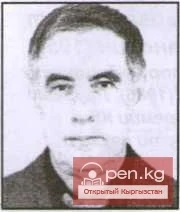
Gurovich Viktor Tsalevich (1937)
Gurovich Viktor Tsalevich (1937), Doctor of Physical and Mathematical Sciences (1983), Professor...

Pools in the Sports Complex "Sun City"
In "Sun City," there are 4 outdoor pools, including a children's pool and a VIP...
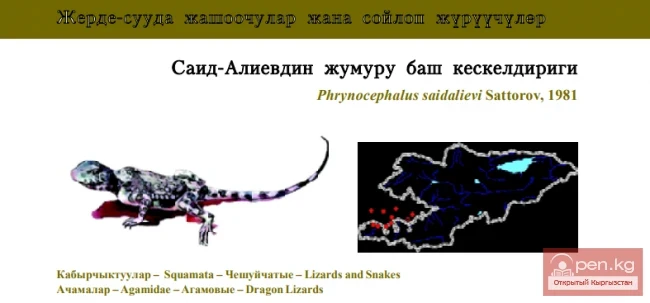
Said-Aliev's Round-Headed Agama / Said-Aliev's Toad Agama / Said-Aliev’s Sunwatcher
Said-Aliev’s Toad Agama Status: Vulnerable (category VUBlab(iii)). A narrowly distributed relic...

Upcoming Events for Lawyers from the British Company "Capital Business Events"
Dear Ladies and Gentlemen!...

Turkic states aim to strengthen economic and trade ties with the EU, - CSTO Secretary General Omuraliyev
Kubanychbek Omuraliyev Omuraliyev also emphasized that the combined GDP of Turkic-speaking...

A unique almanac featuring works by authors from Central Asia has been published.
A unique literary almanac "Creative Commonwealth" was presented in Bishkek, which...
Ordo Sakhna Music from Kyrgyzstan of the Folk Ethnographic Theater
Ordo Sakhna – The Folk Ethnographic Theater. Biography. The folk ethnographic theater Ordo Sakhna...
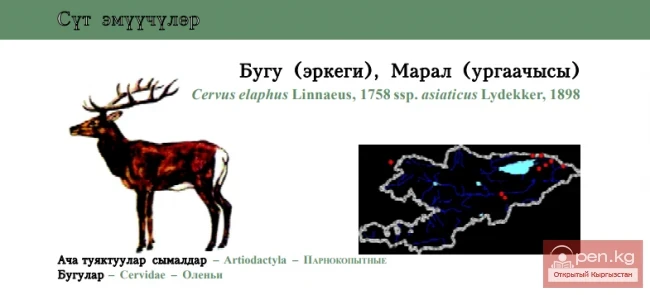
Noble Deer (Tien Shan subspecies), Maral / Bugu (male), Maral (female) / Asiatic Red Deer, Tien Shan Maral, Tien Shan stag
Noble deer (Tien Shan subspecies), Maral Status: Category IV, Endangered, EN C2a(i): R. A sharply...

Issyk-Kul Marinka / Carp Fish / Issyk-Kul Marinka
Issyk-Kul Marinka Status: 2 [EN: D]. A rare taxon inhabiting Lake Issyk-Kul. Its...

The EU adopted the 19th sanctions package with restrictions for Russian banks and diplomats
Illustrative photo In the new sanctions package, as emphasized by Kallas, the main focus is on...
The Beautiful Country Known as Kyrgyzstan
Kyrgyzstan is a small country bordering Uzbekistan, Kazakhstan, and Russia. The main attractions...

Children's Camp "Sun City Kegeti"
Give your child the best vacation! For children aged 7 to 15: fresh air, delicious food,...
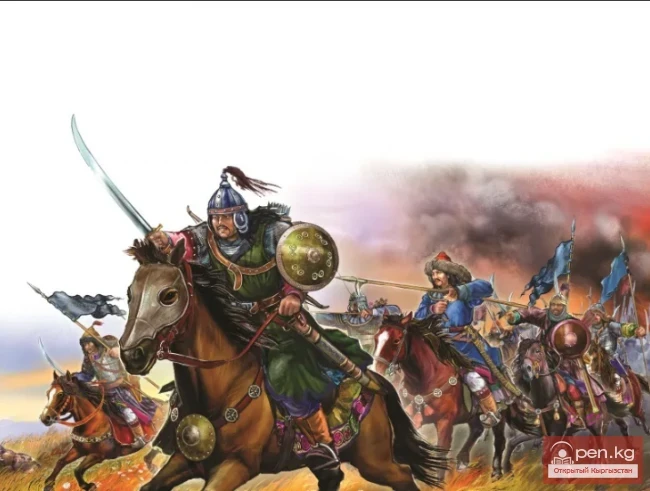
Karluks, Katagans, Kauchins, Kereits
Karluks, Katagans, Kauchins, Kereits Karluks — a large Turkic tribe of Moghulistan. However, there...

Erkin Mirsaidovich Mirrahimov
Mirrahimov Erkin Mirsaidovich (1960), Doctor of Medical Sciences (1995), Professor (1997) Uzbek....
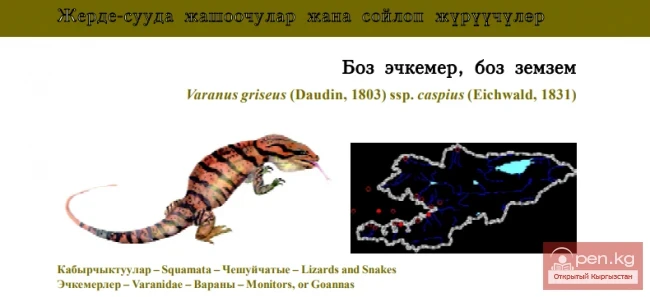
Gray Monitor / Boz Echkemer, Boz Zemzem / Transcaspian Desert Monitor
Gray Monitor Status: Category CR A4bc; E. In Kyrgyzstan - fragmented populations of the declining...
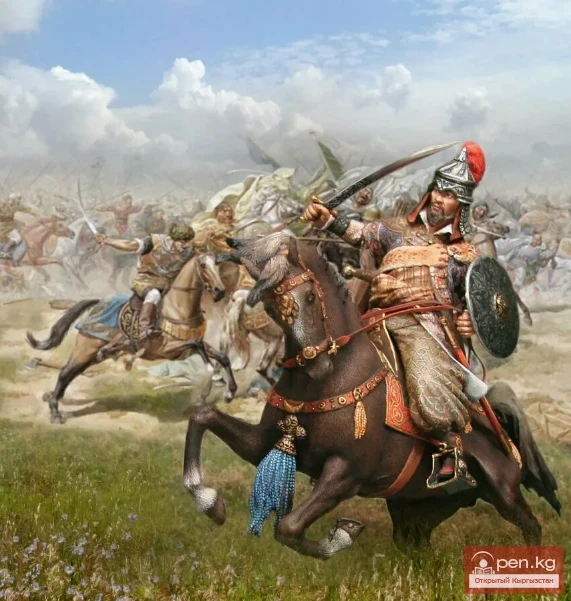
The Social Structure in Moghulistan
Social Structure The country had a feudal system and land grants. Sources mention the yurts of...
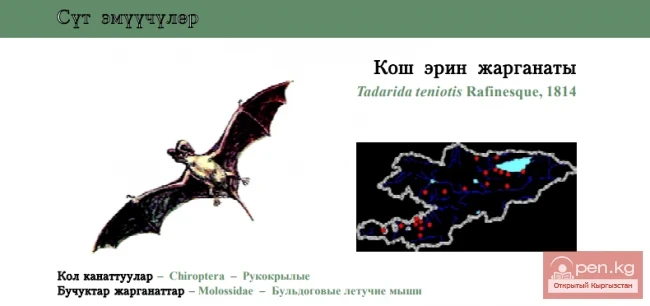
Broad-eared bat / Erin's bat / European Free-tailed bat
Broad-eared bat Status: Category VII, Lower Risk/least concerned, LR/lc....
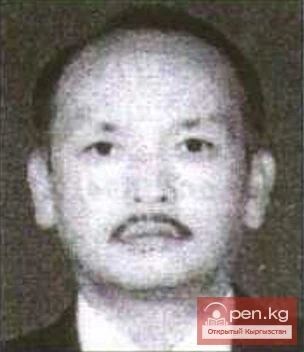
Talaibek Jumashievich Koichumanov
Koychumanov Talaybek Jumashovich (1956), Doctor of Economic Sciences (2000) Kyrgyz. Born in the...
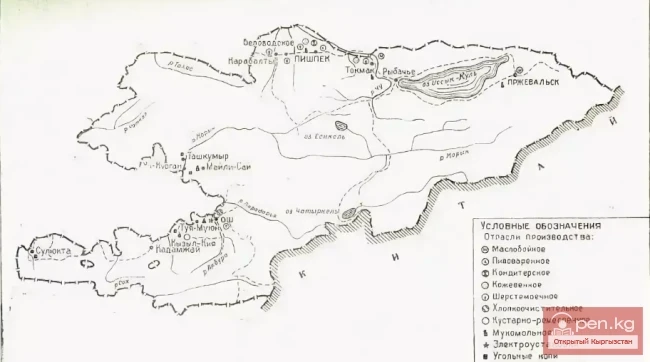
The Industry of Kyrgyzstan within the Russian Empire
The Industry of Kyrgyzstan in the Territory of Turkestan In the early 1890s, intensive exploration...
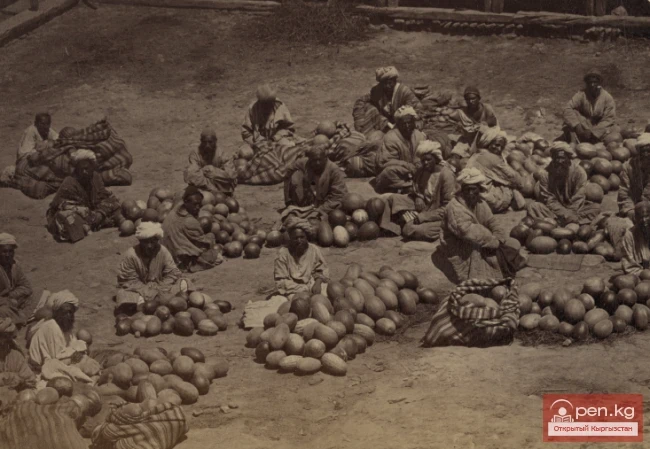
Agriculture in Eastern Turkestan
The Role of Melon and Fruit Cultivation in Eastern Turkestan. Agriculture in Eastern Turkestan was...
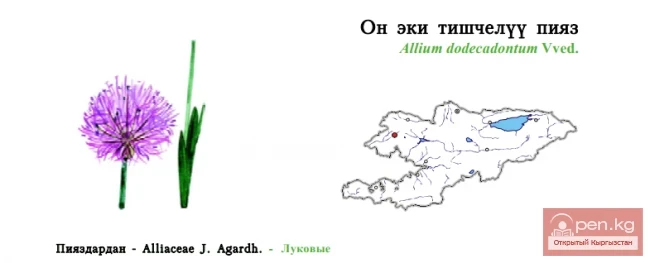
Twelve-dentate Onion
Twelve-dentate Onion Status: VU. A narrowly endemic species of the Chatkal Ridge. Description. A...
